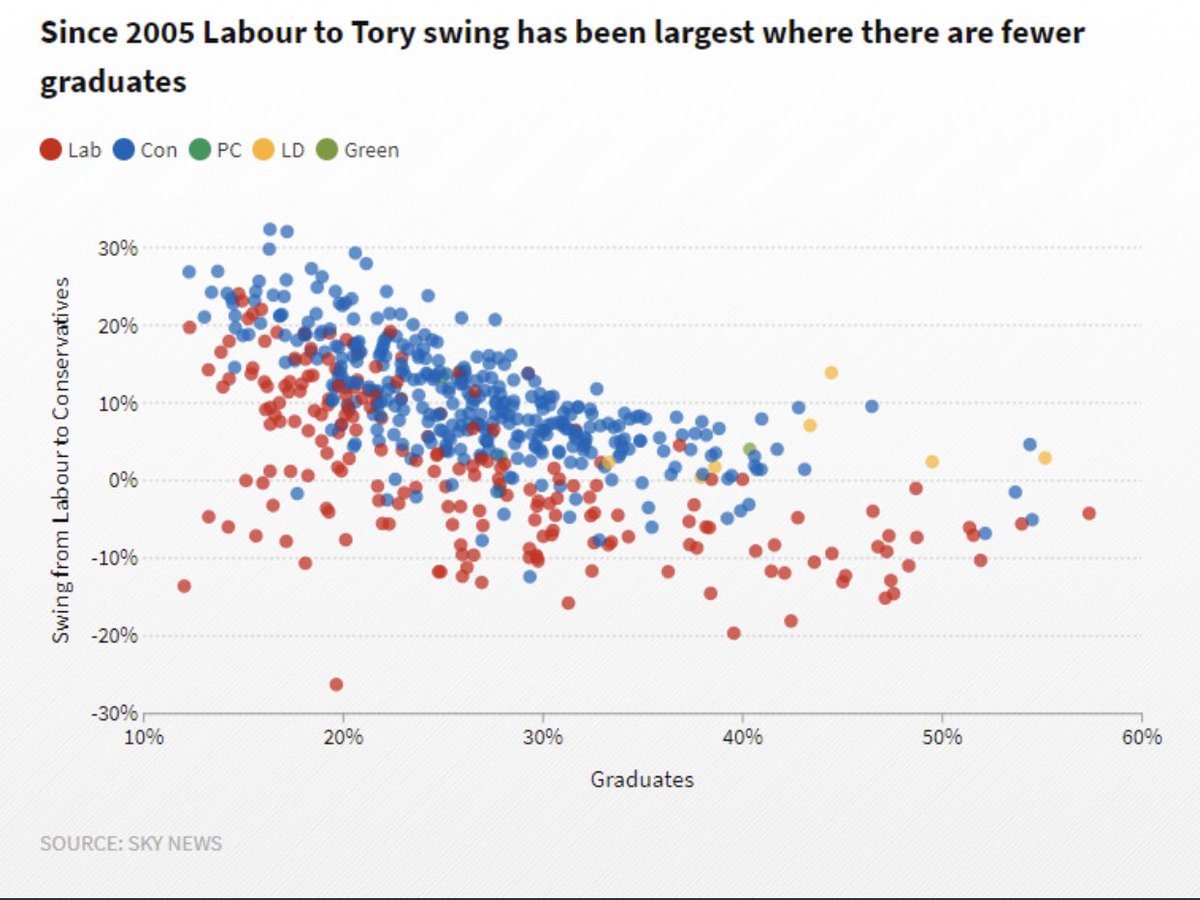2005 — Lab vote share in England, 35%
Lab seats in England, 286
2019 — Lab vote share in England, 34%
Lab seats in England, 180
That is quite a contrast and one I think worth pausing on, although such is the sectarian madness of the Labour party that simply highlight information like this is somehow seen as "making excuses"
It goes without saying Labour will go nowhere unless it can (to borrow the title of the 2005 manifesto) go "forward, not back" under the existing rules of the electoral game
The single biggest difference with that year is, of course, that the Tories are hugely up (by 12 points of UK-wide ballot). And this does represent a real shift to the right, because the other big change has been a corresponding collapse of the centre in the form of the LDs
All politics is relative, so Labour is bound to pay a heavy price for this.
But still, to lose over 100 English MPs off what is roughly a six-point swing between these two years is extraordinary.
Suggests problem is not only about the number of votes, but where they are
I never had much confidence about what Corbyn would do to Lab's vote share, & it turned to be something v different in 2017 and 2019. But from the very beginning (& i can remember chatting to @rafaelbehr in Corbyn's earliest days) I was convinced he'd damage its distribution
Votes were bound to pile up in student towns and diverse inner-cities, where they would bring in few extra seats
At the same time they were always likely to fall away in towns and suburbs where there is more of a premium on patriotism
We saw the first half of this at work in 2017, with the 75%+ Labour shares in Hackney and Walthamstow
Only now, as the overall tide goes out, is the susceptibility to the second exposed
But it is deeper and more cultural than that — votes have been shifting left in more educated places, and right in less educated ones. (A point David Runciman if @TPpodcast_ has been making since the referendum theguardian.com/politics/2016/…)

The cultural front is going to be fraught for ANY Labour leader who wants to try and hold on to its metropolitan voters and members, while also reconnecting with all the communities it lost on Thursday
We can see same dilemmas in the US
When i was a child coal-rich West Virginia was deemed safe Democratic, now it's safe Republican. Dems are said to fear parts of rust belt (marginal in 2016) are now slipping away for good, & their only strategy has to be growing elsewhere
Forget Labour's partisan interests. For the good of society as a whole, it has to be hoped that a Trumpian politics of resentful and rageful nostalgia does not forever displace an older spirit of solidarity our own former mining communities
So, looking the electoral map, the first conclusions I'd draw is that the next Labour leader, from whatever wing, will have an exceptionally difficult job to do in trying to revive the old coalition. Members should not vote on faction, but look for creativity & talent
Even with a decent leader, though, deep demographics (such as the rapid ageing of our towns) mean Labour won't get that ultra-efficient map from 2005 back
Lab's traditional defensiveness about redrawing electoral boundaries may now be displaced (as i've been discussing with @election_data)
In the 80s, new boundaries meant more 'Tory suburb' seats, fewer in cities. These days, it's more likely to be more cities, fewer towns
The bone-headed tribal resistance to PR also needs to go—and urgently. It's a point of principle, but for anyone who is not keen on Bo Jo's hard Brexit, it is also about self-interest: look at @StephenDFisher's analysis of the map if you doubt it prospectmagazine.co.uk/politics/how-d…
Before you can get PR or other reform you have to make progress under current rules, which means getting over the old tribal refusal to co-operate with other parties
Even before we get to Scotland, the 2005 alliance isn't coming back, still less that of 1945. You need help!
The most important lesson of the lot is probably to look outward — thinking about how things look outside your own local community and immediate circle, and not squandering energy on spats within your own tribe
While the challenges are daunting, these are fluid times, and things can shift fast. The new Conservative coalition, just as much as the old Labour one, is decidedly fragile
I'll shut up with my "cheer up" piece from yesterday
prospectmagazine.co.uk/politics/six-r…



